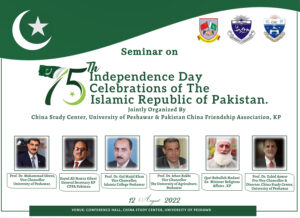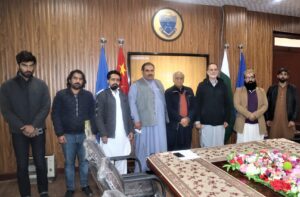The China Study Centre, University of Peshawar, in collaboration with the Department of International Relations and History, and with partial financial support from the Directorate of Youth Affairs, Government of Khyber Pakhtunkhwa, DOSTI Foundation, and The Natives, successfully organized a four-day national conference titled ‘Building Resilient Future: Climate Adaptation, Historical Change, and Global Cooperation’ from October 16-19, 2025. The conference took place at the picturesque Baragali Summer Campus of the University of Peshawar, bringing together scholars, researchers, and youth from across the country to discuss pressing issues related to climate resilience, sustainable development, and global cooperation.
The conference had a special focus on China’s role in climate change resilience and mitigation, with a number of research papers exploring the potential of China’s mega projects, such as the China-Pakistan Economic Corridor (CPEC) and the Silk Road Economic Belt, in promoting climate resilience. The event provided a vital platform for participants to exchange ideas, share knowledge, and engage in meaningful discussions on the environmental challenges confronting Pakistan and the role of youth and academia in addressing them.
Renowned speakers, including Dr. Noor Sanauddin, Director of the China Study Centre, Dr. Altaf Qadir, Chairman of the Department of History, and Dr. Husnul Amin, Director of NIPS Quaid-i-Azam University Islamabad, among others, shared their expertise and insights on climate adaptation strategies, policy formulation, and practical approaches to mitigate environmental degradation. The conference featured extensive discussions, with over 26 rese arch papers presented by young researchers and scholars.
The participants emphasized the need for stronger policy dialogues, population management, integration of climate education into curricula, and greater utilization of seminaries and community centers for climate advocacy. They also stressed the importance of reforming corporate social responsibility (CSR) frameworks, analyzing industrial impacts, and undertaking social action projects for environmental protection. The conference called for highlighting Pakistan’s climate losses at international forums to attract global attention and cooperation.
The Vice Chancellor of the University of Peshawar, Prof. Dr. Johar Ali, graced the closing ceremony as the Chief Guest, praising the China Study Centre for organizing a youth-led conference that enabled young researchers to contribute meaningfully to the national and global discourse on climate resilience. The participants applauded the Centre’s efforts in promoting research, collaboration, and knowledge sharing, and urged for continued support and initiatives to address the pressing environmental challenges facing Pakistan.
The China Study Centre’s role in promoting China-Pakistan cooperation and knowledge sharing was evident throughout the conference, with many speakers highlighting the importance of China’s involvement in addressing climate change and promoting sustainable development. The conference demonstrated the Centre’s commitment to fostering academic collaboration, cultural dialogue, and intellectual exploration, and its dedication to addressing the complex challenges facing Pakistan and the world.












